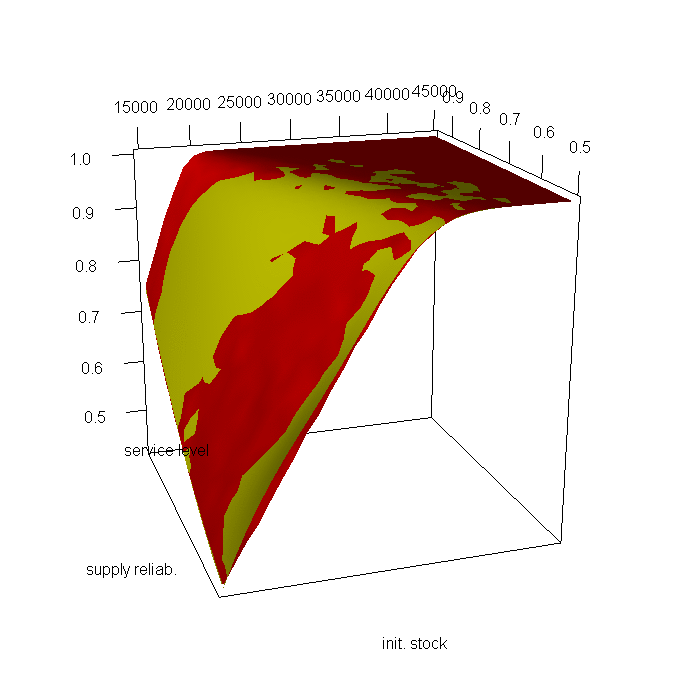Dr. Thomas Kirschstein

Contact
Room 130
Große Steinstraße 73
06108 Halle (Saale)
Tel.: (0345) 5523382
Fax: (0345) 5527191
E-Mail: thomas.kirschstein@wiwi.uni-halle.de
Office hours: on appointment
Overview
Curriculum Vitae
- 07/2014 received PhD
- since 03/2008 research assistant at the MLU [third-party funds project]
- 03/2007 - 10/2007 diploma-internship at the Dow
- 06/2006 - 12/2006 student assistant at the IWH
- 10/2003 - 03/2008 Business Studies at the MLU
- 10/2002 - 10/2003 studied mathematics at the MLU
- born in 1981
Project: Integrated planning of logistical processes in complex production networks

Source: Reuters
Scope and Objectives
Often modern production processes are characterized by a huge amount of elements and interacting decision makers. Usually, the planning of such complex processes cannot be done by an "overall" model due to solvability or limited computational resources. Therefore, typically the overall production process is split in sub-processes and their corresponding planning objects/problems, which are representable and solvable. This approach is repeated on different levels of aggregation to cover different planning horizons. This results in the conception of modern advanced planning systems (APS).
This procedure has the principle drawback, that the interdependencies between the sub-processes are not omitted or at least simplified. Hence, the necessity of interacting of the sub-models (i.e. (inter-)exchanging sub-model results) arises to obtain a "good" overall process configuration. Unfortunately, this approach usually not leads to the "global" optimum. This problem is addressed by integration of different sub-models. This is done either by the development of new models covering different planning problems explicitly or by the development of coordination procedures organizing the interaction between different sub-models, to obtain "global" optimum.
In this project a holistic approach for the integration of different sub-models should be developed focusing on logistical processes. This approach aims to embed sub-models in a simulation environment considering their interdependencies explicitly. This is done on the basis of a case study from the Dow Olefinverbund GmbH investigating the logistical and production processes in site network Schkopau/Böhlen/Leuna/Teutschenthal.
For modeling the different sub-processes the following techniques are used:
- Time series models for representing the production processes
- Linear programs for several logistical sub-problem
- Design of experiments methods for determining parameter effects and their interactions
All in all, the aim is to develop a decision support tool, that is able give a complete, valid overview about the interaction of all elements and parameters at the sites Schkopau/Böhlen/Leuna/Teutschenthal. Additionally, recommendations should be given for the logistic system's reconfiguration to increase overall performance.

Sources
- Shapiro, J. (2004), "Challenges of strategic supply chain planning and modelling", Computers and Chemical Engineering, 28, S. 855-861.
- Shah, N. (2005), "Process industry supply chains: Advances and challenges", Computers and Chemical Engineering, 29, S. 1225-1235.
- Puigjaner, L., Guillén-Gonsálbez, G. (2008), "Towards an integrated framework for supply chain management in the batch chemical process industry", Computers and Chemical Engineering, 32, S. 650-670.
- Goetschalckx, M., Vidal, C., Dogan, K. (2002), "Modelling and design of global logistics systems: A review of integrated strategic and tactical models and design algorithms", European Journal of Operational Research, 143, S. 1-18.
- Sabri, E., Beamon, B. (2000), "A multi-objective approach to simultaneous strategic and operational planning in supply chain design", Omega, 28, S. 581-598
Talks
- Thomas Kirschstein: Planning and optimization of integrated logistical activities in a large-scaled production network of the chemical industry, Betriebswirtschaftliches Doktorandenkolloquium, Halle/Saale, 15.07.2009
- Thomas Kirschstein: Kooperation zwischen dem Wirtschaftswissenschaftlichen Bereich und DOW, Lange Nacht der Wissenschaften (Night of Science), Martin-Luther-University, Halle,03.07.2009
- Thomas Kirschstein: Planning and optimization of integrated logistical activities in a large scaled production network of the chemical industry, 11th Mitteldeutscher Doktorandenworkshop (Middle German PhD workshop), Berlin, 29.05.2009
- Thomas Kirschstein: An integrated train scheduling model under inventory and recurring rail car restrictions, 13th Doktorandenworkshop Nordost (Middle German PhD workshop), Göttingen, 21.05.2011
Project: Robust tree-based estimators
In most applications of statistical techniques data sets have to be handled that are contamined by some kinds of measurement errors or missing values. On specific case of contamination are observations/measurements which are apart from the main body of data. These are usually called outliers.
Outliers may heavily affect standard procedures in statistcs such as location and covariance estimation. To deal with outliers in loation and covariance estimation a large body of robust approaches have been developed such as M- and S-estimators or MCD and MVE. All these established approaches assume an elliptic or at least convex shaped distribution of the main bulk of data to determine outlying observations.
In this project approaches should be developed and investigated that fix this drawback and, hence, are applicable for non-convex shaped data, too. As an first approach a minimal-spanning-tree-based approach has been developed. Special emphasis is put on the statistical properties of this approache including breakdown point and efficiency.
Basic references:
- Bennett, M. and Willemain, T. (2001), "Resistant estimation of multivariate location using minimum spanning trees", Journal of Statistical Computation
and Simulation, 69, p. 19-40. - Lopuhaä, H. and Rousseeuw, P. (1991), "Breakdown properties of affine equivariant estimators of multivariate location and covariance matrices", The Annals of Statistic, 19, p. 229-248.
Project-based talks
- Becker, C./Kirschstein, T./Liebscher, S.: Finite sample efficiency of tree-based estimators for location and scatter; ICORS 2012, Burlington, 7.8.2012.
- Kirschstein, T./Liebscher, S./Becker, C.: RDELA - A Delaunay-Triangulation-based, Location and Covariance Estimator with High Breakdown Point; Statistische Woche 2011, Leipzig, 21.09.2011.
- Liebscher, S./Kirschstein, T./Becker, C.: Finding the bad ones - Identifying unsuccessful warship designs; JSM2011 - Joint Statistical Meetings, Miami, 04.08.2011.
- Liebscher, S./Kirschstein, T./Porzio, G.C./Ragozini, G.: Multivariate modal regions: applications in robust statistics and related computational issues; ICORS2011 - International Conference on Robust Statistics, Valladolid, 28.06.2011.
- Liebscher, S./Kirschstein, T./Becker, C. : The Flood Algorithm - A Multivariate, Self-Organizing-Map-based, Robust Location and Covariance Estimator; ICORS2010, Prag, 29.06.2010.
- Liebscher, S./Kirschstein, T./Becker, C. : The Flood Algorithm - A Multivariate, Self-Organizing-Map-based, Robust Location and Covariance Estimator -- Computational Results --, DagStat2010, Dortmund, 25.03.2010
- Kirschstein, T./Liebscher, S./ Becker, C. : A robust location and covariance estimator based on pruning the Minimum Spanning Tree, DagStat2010, Dortmund, 24.03.2010
Publications
- Meisel, F./Kirschstein, T./Bierwirth, C. (201x): "Integrated Production and Intermodal Transportation Planning in Large Scale Production-Distribution-Networks", to appear in Transportation Research Part E: Logistics and Transportation Review.
- Kirschstein, T./Liebscher, S./Becker, C. (2013): "Robust estimation of location and scatter by pruning the minimum spanning tree", Journal of Multivariate Analysis, 120, 173-184, DOI: http://dx.doi.org/10.1016/j.jmva.2013.05.004 .
- Liebscher, S./Kirschstein, T./Becker, C. (201x): "RDELA - A Delaunay-Triangulation-based, Location and Covariance Estimator with High Breakdown Point", to appear in Statistics and Computing, DOI: 10.1007/s11222-012-9337-5 .
- Becker, C./Liebscher, S./Kirschstein, T. (2013): "Multivariate outlier identification based on robust estimators of location and scatter", In Becker, C./Fried, R./Kuhnt, S. (Eds.), Robustness and Complex Data Structures - Festschrift in Honour of Ursula Gather, 103-115, Springer, DOI: 10.1007/978-3-642-35494-6_7 .
- Bierwirth, C./Kirschstein, T./Meisel, F. (2012): "On Transport Service Selection in Intermodal Rail/Road Distribution Networks", in Business Research, 5 , 1-23.
- Liebscher, S./Kirschstein, T. (2012): "Identification of unbalanced warship designs using multivariate outlier detection procedures". Military Operations Research Journal, 17, 31-43, DOI: 10.5711/1082598317131 .
- Liebscher, S./Kirschstein, T./Becker, C. (2012): "The Flood Algorithm - A Multivariate, Self-Organizing-Map-based, Robust Location and Covariance Estimator". Statistics and Computing, 22(1), 325-336, DOI: 10.1007/s11222-011-9250-3.
- Liebscher, S./Kirschstein, T./Becker, C. (2011): "Finding the bad ones - Identifying unsuccessful warship designs", In JSM Proceedings, Section on Statistics in Defense and National Security. Alexandria, VA: American Statistical Association. 1295-1307.
Teaching
interdisciplinary scientific consultation in process industry (WS 08/09; WS 09/10)

